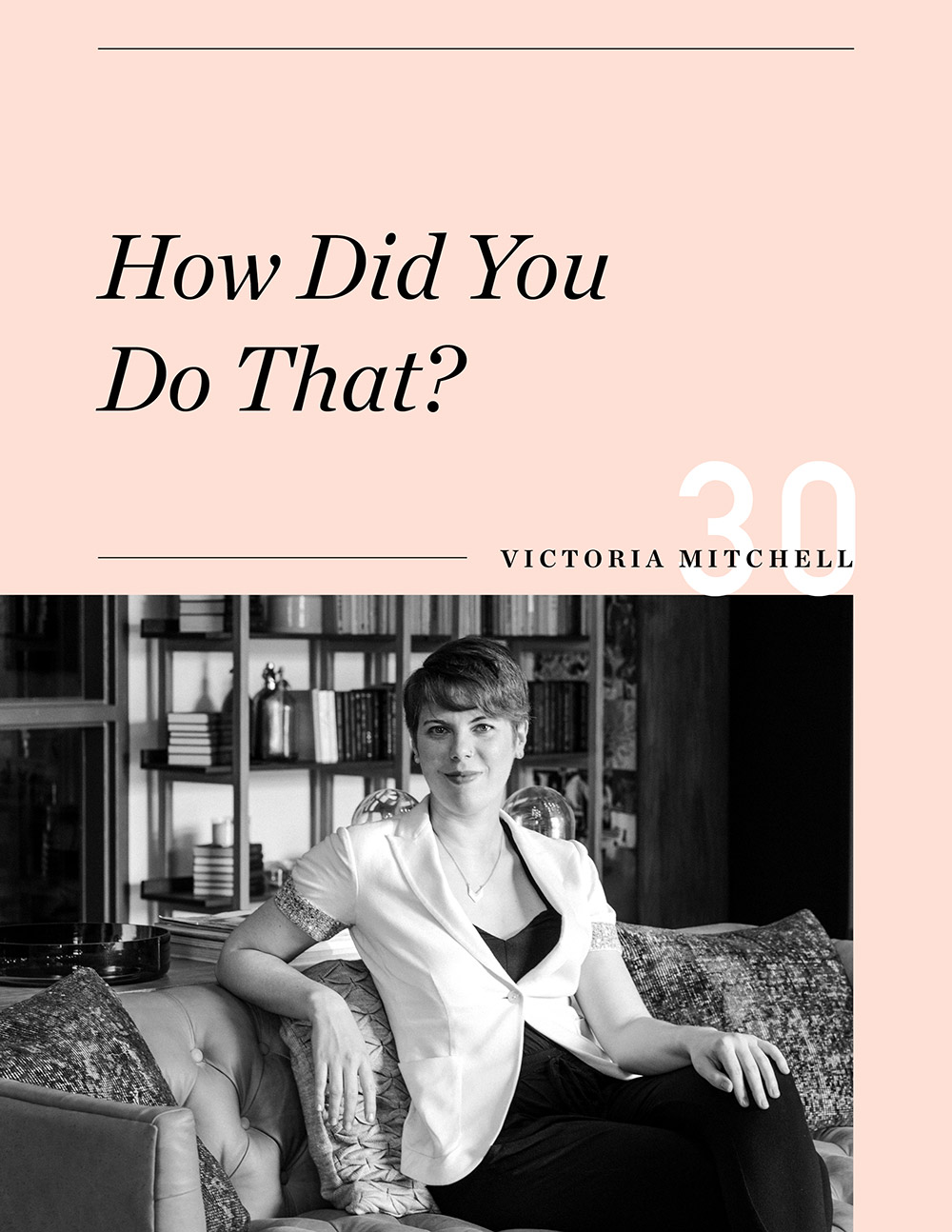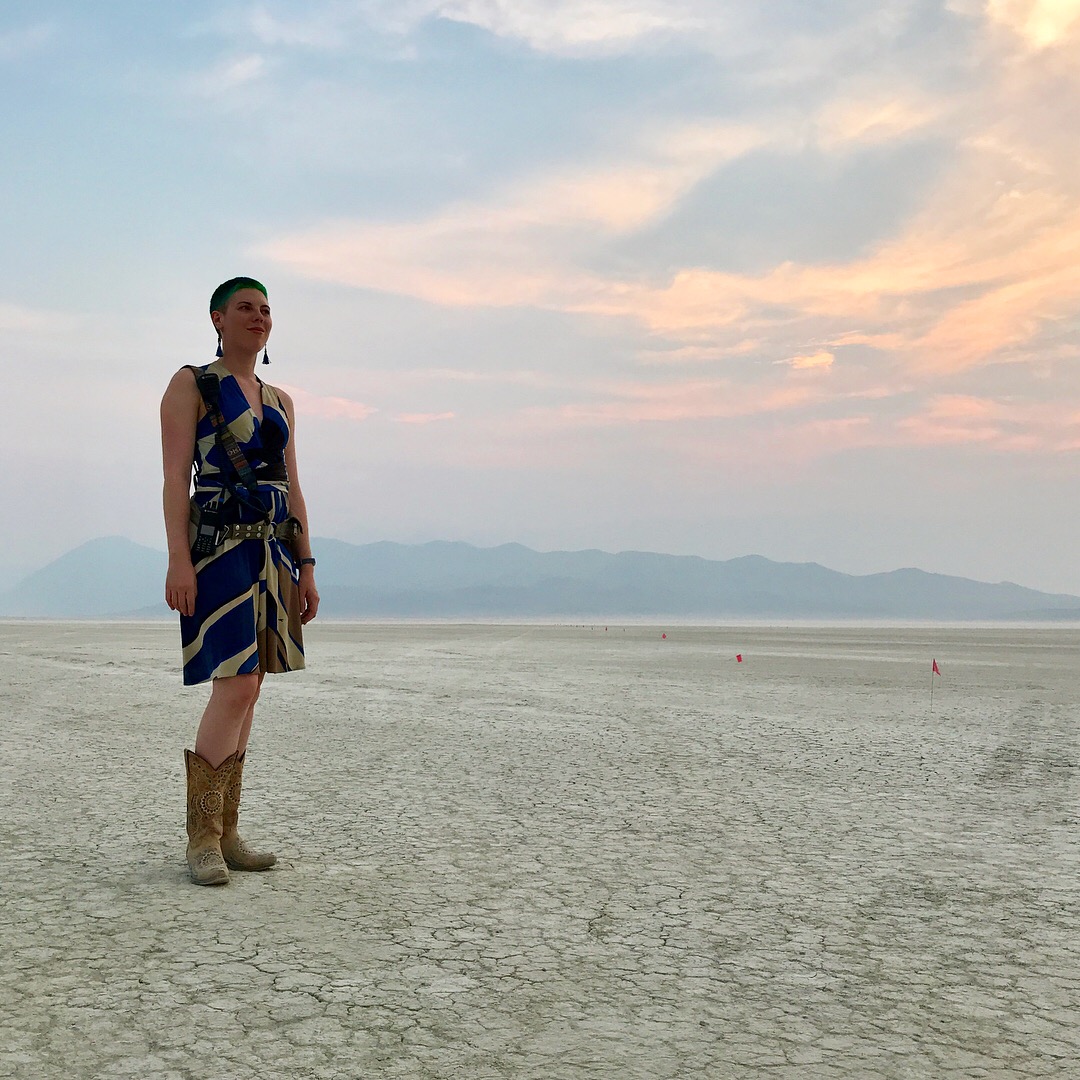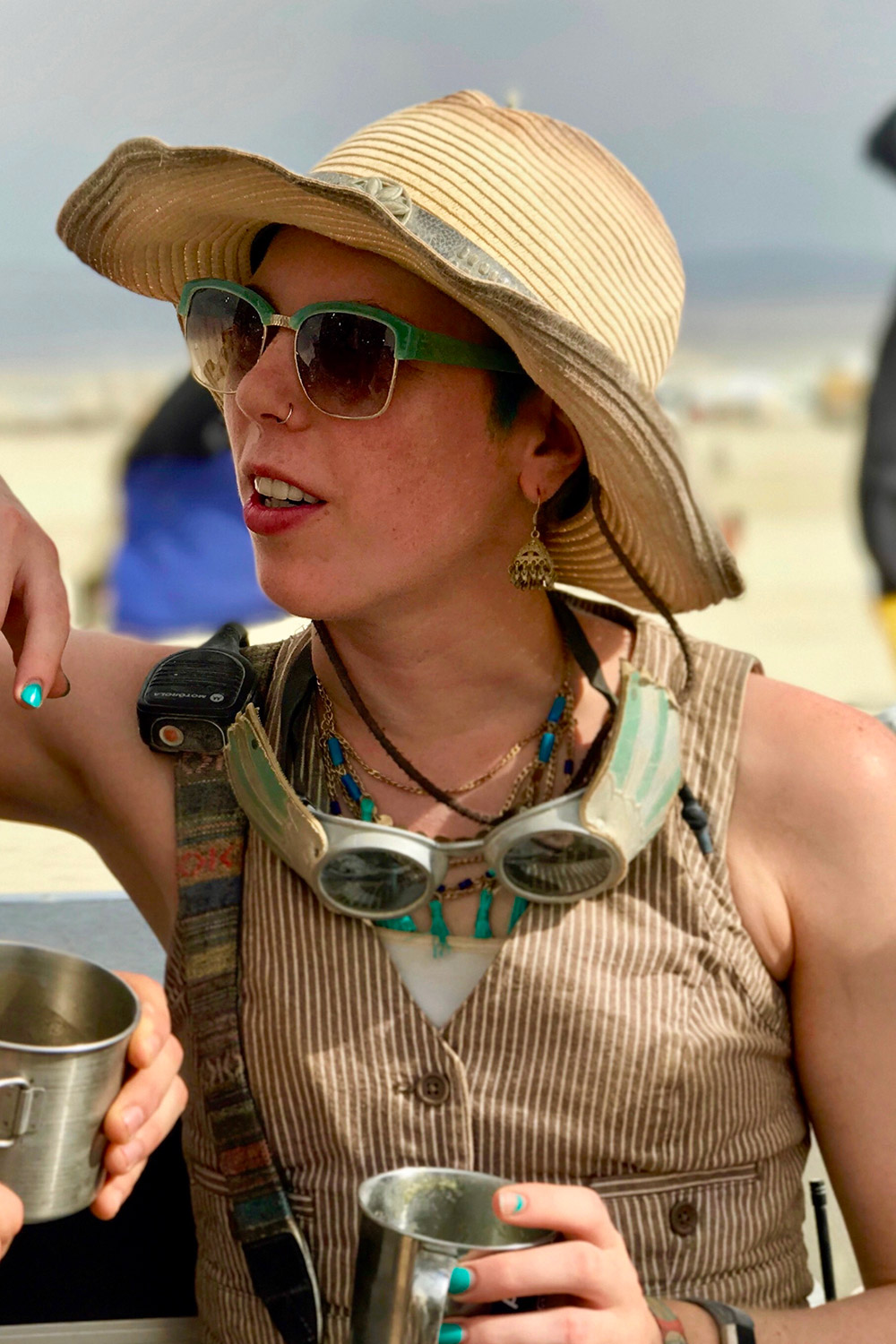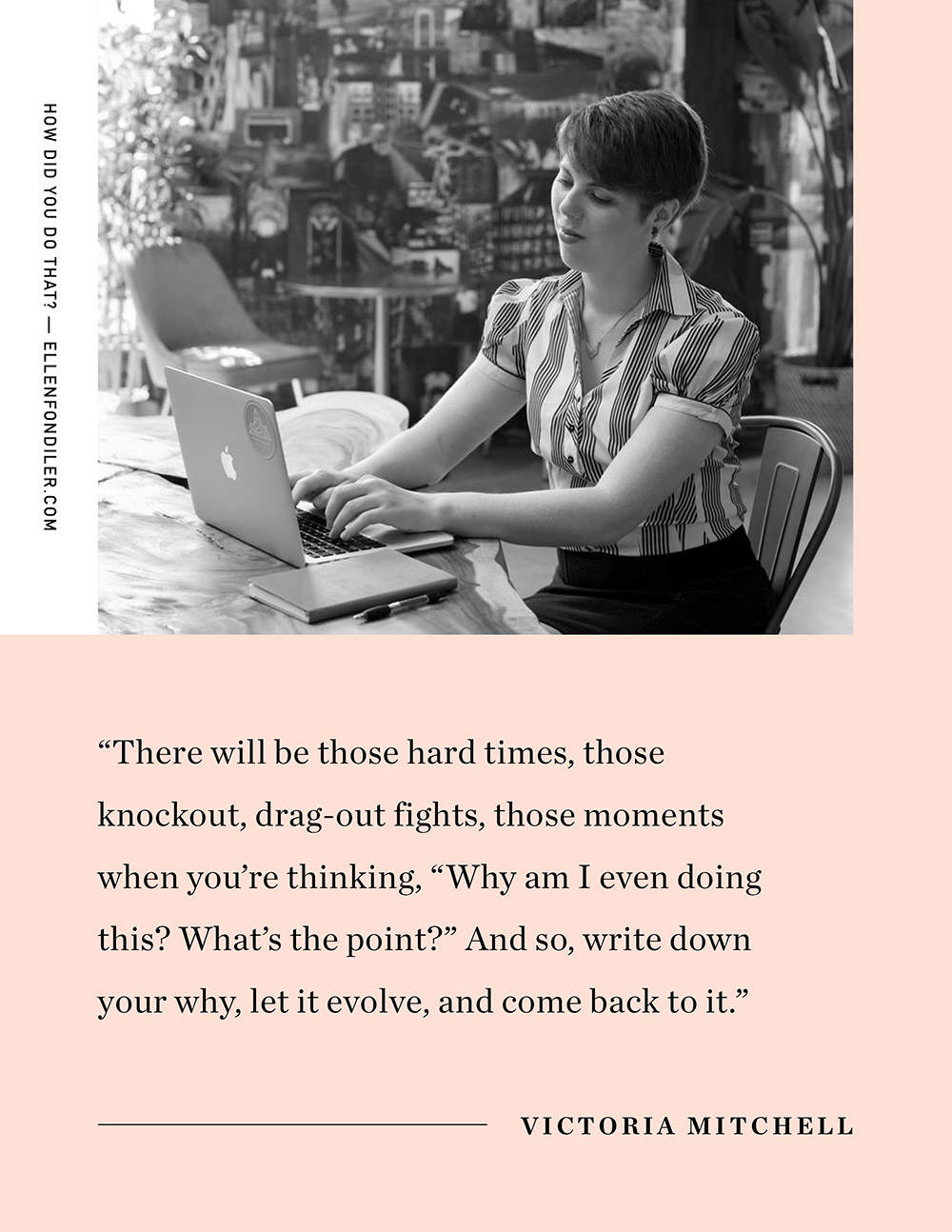
Whenever I meet someone who’s got a really cool job, who runs a thriving business, or who has completed an amazing project, I always want to know: “How did you do that?”
I’m always curious to hear the “behind-the-scenes story” — who they emailed, what they said, how they got their first client, how they got their foot in the door — the exact steps that they took to achieve their goal.
HOW DID YOU DO THAT? is an interview series where we get to hear the REAL story behind someone’s success—not the polished, neat and tidy version.
To see a complete list of all the interviews that have been completed to date, head over here.

Name: Victoria Mitchell
Location: San Francisco, California
Profession:Placement Manager at Burning Man and Operations Leader
You described that your life’s work is cultivating the culture of community. Tell me what you mean by that and what that means to you.
I grew up Mormon, and it was just an incredible experience in so many ways. I’m no longer a part of the church, I no longer subscribe to the religion, but the closeness I felt to my family, to the elders in my community, to other families, made me feel very whole. And when my immediate family left the church, there was this missing piece for me.
In addition, I moved a lot growing up, and so, I always had to make new friends, I always had to reinvent myself, and didn’t have that continuous thread of people who knew me my whole life or through every context except for my immediate family.
I’ve only since come to realize this thread has carried forth in everything I’ve done. I think a lot about how disconnected our culture has become and how the influence of technology on our relationships is so powerful. I love technology, but if we don’t think about it in a human-centric way, then we have a very, very strong likelihood of driving ourselves far apart.
I don’t want to be a part of that future, and so, my life’s work is to cultivate that culture of community; that deepest level of knowing and being and doing when we interact and relate, and prioritize connection.
You work to create the mother of all communities, Burning Man. Tell us what you do and how you go about setting up Black Rock City each year, how long it takes, how many people are involved. Just give us the whole picture.
Black Rock City is the largest Burning Man event, one of more than 70 that take place throughout the year. Every year in the late summer we collectively create a city of 70,000 people. It takes place on the Black Rock Desert, which is in Nevada.
There are about 100-year-round folks in the Burning Man headquarters, many hundreds of seasonal paid folks, and then many thousands of volunteers who make Black Rock City happen. The other 60,000-plus people who attend Burning Man are also contributors, though it’s not like a typical festival where you have the staff that put on the entertainment and get the vendors and the food set up and then you show up with your tent or your car and you car-camp. It’s not like that at all. Everyone is a contributor. We’re all citizens of the city that we create together. So, part of that, and part of my role, is working with all of the camps and the people that come to Black Rock City.
There are over 1,500 organized camps, with anywhere between 5 to 400 people per camp. Camp questionnaires are due by the last Thursday in April. When you register, you tell us what you’re bringing to the city, what experiences your camps will provide, what services, what funny weird things, and what kind of visual creations you’ll make. After all the camps register, my team, the Placement Team, looks through all of the information, and creates the map of Black Rock City. We do a very unique city planning exercise each year where we get to create a city. We figure out what kind of neighborhoods we want to build, who will make good neighbors, etc.
It’s kind of like playing Tetris. You have all these different city blocks and you’re like, “Hey, this is a 100 x 100 ft. camp. This is a 300 x 200. This is a 50 x 50.” The team spends two full weekends mapping the city using pencil and paper. The city’s divided into sectors, so each sector team does their mapping and puts their area together, and all together, that makes Black Rock City.
You obviously get to Black Rock City way in advance of the actual event. How early do you get there and what takes place before the people arrive?
I get there by the beginning of August. Our Department of Public Works are the infrastructure creators of Black Rock City. They also do the initial survey of the whole place. Where is the Man, which is the center of our city, where are the major points that this event can take place in this desert?
And then another team I oversee, the Flagging Team, puts in all of the little survey flags for every single camp. Last year, a team of about 10 people put over 18,000 survey flags into the ground over about three weeks. It’s like taking that Tetris and making it real. It’s an amazing feeling when it all starts coming to life.
The Placement Team’s job is to place each camp. So, when the first arrivers of each camp come, we show them to their spot, we show them their boundaries of the space. They bring everything to fill it in and to create the experience.
Is there an internal political system? Do people end up jockeying for power?
There’s no political system, we don’t have a mayor or elections or anything like that. We have what we call Rangers, who are essentially a community-based force for good. They’re folks who can do conflict resolution, who can handle a sensitive issue, or help someone who’s struggling. So, they’re always around; they’re a community resource. We also have emergency services, a hospital and an airport; basically all the things that a large city would have.
And people bring their own food, so you don’t have to worry about that.
Yes. One of our principles is Radical Self Reliance. We pretty much just set the platform for engagement and then people make it happen. I like to think of it as a co-created city.
Burning Man’s been around since 1986 so it’s had a long evolution. We’re now a non-profit spreading our culture through the global network of people affiliated with Burning Man, civic art installations, education programs and the other events around the world that I spoke about. Black Rock City is a big push for us.
How does it feel to build all of this and then to have it destroyed? Is that difficult?
I find it beautiful. I really love it. I think impermanence teaches us a lot. One of our principles is Gifting, so, the experience of gifting something and then having that kind of evaporate into the ether just really reinforces why we give and that giving doesn’t have to be connected to getting. When the get isn’t there and you don’t get to keep the gift, you really just give to give it. It’s pretty fascinating.
What happens after it is done?
We debrief and then we take a deep breath and start again.

What were you were doing before you joined the team at Burning Man?
I was the Director of Operations at Zesty, a catering start-up in the Bay Area. They were recently acquired by Square. We served about 50,000 meals a week at the time I left. I was there since the early days and oversaw the operations support, our workforce, inventory, and did a lot of people management.
There’s been a lot written in the past few years about all the money that’s arriving at Black Rock City, the airports and the helicopters and the beautiful tents. How do you feel about that, how does that impact the whole experience?
It’s been interesting. Festival culture has really taken off to a new popularity level in the last five or so years, and so those impacts are bigger than Burning Man. One of our principles is Radical Inclusion, and how we evolve is a really tough question that our community’s been grappling with. I think about it on a cultural level, and I’m doing some strategic work around how we figure it all out. I don’t necessarily have the right answer.
When I was at the American Planning Association’s Conference last fall with California city planners from all over the state, issues such as gentrification, class change, homelessness were the topics everyone was talking about and dealing with. I don’t think I talked to single person who could have said that it wasn’t impacting their community.
I’m really interested in how Black Rock City learns from, teaches and has relationships with, other places that are experimenting and trying to figure out that balance of the diversity of a community that makes it what it is, but also embraces impermanence and changes.
I read a description of you on your LinkedIn profile, that you are good mix between a unicorn and a lion. I thought it was one of the best lines I had ever read. Does it describe you? Is that how you would describe yourself?
A Colleague from Zesty wrote that about me. I think it’s pretty accurate.
I tend to throw myself into things, get things done. I try to be courageous whenever I can and confront my fear or at least notice it. Sometimes it’s hard to actually push through it, but I like to at least sit with it. So that is the lion part of me. And the unicorn, I think, is the magic of how I view the world and how I’ve woven together all the people in my life and the experiences I’ve had.
What are your favorite parts of Burning Man and your least favorite?
I just like being able to build things, and so that’s a big one. And, the people. I’ve really found the most important people of my life through my connections in the Burning Man world. I also love watching the different types of communities go through their cycles: watch them build, watch them grow, and watch them dismantle everything at the end.
I think something I don’t like is the workaholic culture that comes along with building something as massive as Black Rock City. I struggle with overworking, and I have my whole life. It is very easily fed out there. We do a lot, we got a lot done, but people burn out, people hit rock bottom.
I also sometimes struggle balancing the party atmosphere of Burning Man with the contemplative aspects. It’s easy to fall into extremes at Burning Man and navigating that can be tough.
When you’re having a really hard day, how do you get through it? What do you do to deal with it?
I have a whole series of grounding rituals that I do that have evolved over time. And so, if I’m having a hard day, I will pull something out of that repertoire, to help get me back to what’s important.
I’m very committed to my daily meditation practice. Every morning, I have a whole series of things that I do: I stretch for five minutes; I breathe into my belly, and then I flip and I breathe on my back; then I meditate; and then I write down my intentions for the day.
The other way that I focus on this is I zoom out a lot. I’ll think of myself when I’m 90. I’ll just close my eyes and I’ll picture 90-year-old Victoria looking back at me, with all kinds of compassion.
She’s very wise, that future me.

One last question. If someone wants to cultivate an intentional community, whether it’s a work space, a Facebook group, or living with a lot of people, what are three pieces of advice you would give them?
I love this question.
1. You can’t do it alone.
No matter what kind of community you want to form, consider it a participatory process. How can you involve other people? How can you lean on participatory process tools to help you through tough conversations, through decision-making, and create something that other folks feel connected to and want to be a part of?
2. Stay focused on your why.
There will be those hard times, those knockout, drag-out fights, those moments when you’re thinking, “Why am I even doing this? What’s the point?” And so, write down your why, let it evolve, and come back to it. It will be a little bit different for everybody who is engaged in your community, but it is important to stay focused on why you are there in the first place.
3. Pay attention to the tactical side of things.
Figure out who is going to be in leadership roles, who is going to be accountable for taking on different aspects of projects, who will determine how you’re going to move everything forward. You need some structure when you’re involving a lot of people. I’ve witnessed so many communities come and go, and rise and fall. Sometimes they fall apart almost perfectly. It was the end of the road. There was nowhere further to go. But sometimes they fall apart because they just weren’t organized enough. And I think that one’s totally preventable.
To learn more about Victoria- check out her website: https://www.victoriamitchell.me or follow her on Instagram at @hivictoriam.
ONE MORE THING…
Do you have “one more quick question” that you’d like to ask Victoria? Email me and tell me what you want to know! I might choose your question for my ONE MORE THING… Podcast (Coming soon!!!)
YOUR #1 CAREER GOAL: ACHIEVED
Do you need some encouragement to help you achieve a big, daunting career goal? Would you like to have a career coach/strategist in your corner—feeding you ideas that you’d never considered before, helping you figure out who to contact, and what to say, and checking in to make sure you don’t procrastinate? If so… click here to find out how we can work together. I’d love to coach you!
![]()
